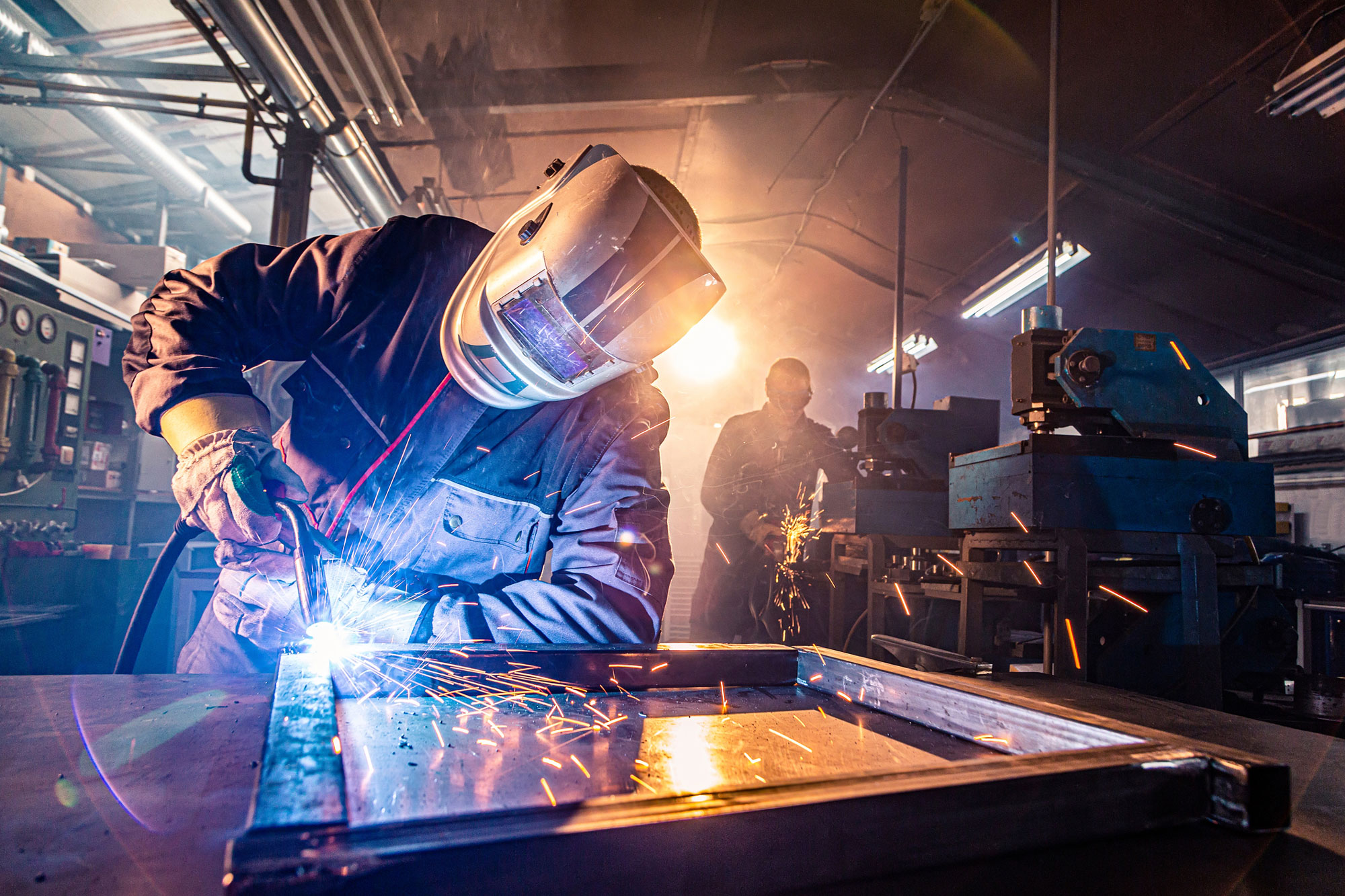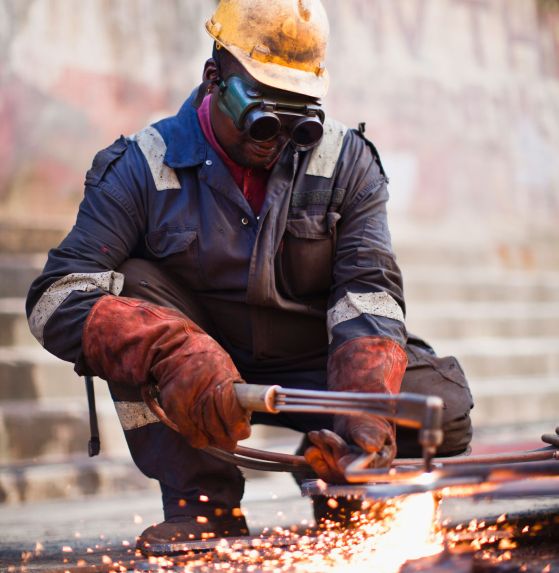Welding

COMMITMENT
MODE OF STUDY
TERMS OFFERED
CAREER FIELD(S)
COST
Exams and textbooks are not included in price.
FUNDING
CAMPUSES
Are you looking for a hands-on, creative career?
Welding is a specialized skill and an art form used in a variety of industries worldwide. CT State offers several welding courses and certificates for both beginner and advanced students to help give you the qualifications that will prepare you for a career as a skilled welder in just a few months.
CT State Naugatuck Valley is an Approved Testing Facility for the Connecticut Department of Transportation CONNDOT) welding certification.
All welding courses are held at the CT State Naugatuck Valley Waterbury campus.
Contact
Phone: 203-575-8029
Fax: 203-575-8243
Email: NV-CED@ctstate.edu
Address: CT State Naugatuck Valley,
Non-credit Registration-F323
Sharon Lutkus, Director of Advanced Manufacturing and Welding
Email: sharon.lutkus@ctstate.edu
Upcoming Courses
Please note that students must be at least 18 years old to participate in these courses.
A Career in Welding
Welding Career Opportunities
- Welders, Cutters and Welder Fitters
- Welding, Soldering and Brazing Machine Setters, Operators and Tenders
- Structural Metal Fabricators and Fitters
- Sheet Metal Workers
- Commercial Divers
- Solderers and Brazers
- Boilermakers
- Layout Workers, Metal and Plastic
- Pipe Fitters and Steamfitters
- Structural Iron and Steel Workers
- Materials Engineers
- Bus and Truck Mechanics and Diesel Engine Specialists
- Rail Car Repairers
- Industrial Machinery Mechanics
- Machinists
- Reinforcing Iron and Rebar Workers
- First-Line Supervisors of Mechanics, Installers, and Repairers
- Control and Valve Installers and Repairers, Except Mechanical Door
- Electro-Mechanical Technicians
- Certified Welding Inspectors (CWI)

Find Work In
- Welding shops
- Manufacturing of metal goods
- The petroleum and natural fuel extraction industry
- Construction
- Plumbing and pipe welding
- Plant maintenance
- Automobile manufacturing and repair
- Shipbuilding
- Aerospace
- Railroad construction and repair
- and more…
Welding Certificates at a Glance
Structural SMAW (STICK)
130 hours
Courses in This Certificate:
- Basic SMAW
- Advanced Structural SMAW with certification
- OSHA 10 General/Manufacturing
GTAW (TIG) Certificate
100 hours
Courses in This Certificate:
- Basic GTAW
- Advanced GTAW with certification
- OSHA 10 General/Manufacturing
GMAW (MIG) Certificate
100 hours
Courses in This Certificate:
- Basic GMAW
- Advanced GMAW with certification
- OSHA 10 General/Manufacturing
Welding Courses
Gas Metal Arc Welding (GMAW) Basic
Time Commitment: 45 hrs
Cost: $2,100
GMAW, also known as MIG welding, is a process used mostly in manufacturing and repair shops. Students will be introduced to welding safety, shield gases, oxy-acetylene cutting equipment and metal preparation.
Gas Metal Arc Welding (GMAW) Advanced
Time Commitment: 55 hrs
Cost: $2,500
This advanced course in GMAW will prepare the student for welding certification. Students will be tested in accordance with the American Welding Society (AWS) D1.1 3G certification. OSHA 10 Safety Certification is included in this course. 55 hours
Prerequisite: Basic GMAW or permission of the instructor.
Gas Tungsten Arc Welding (GTAW) Basic
Time Commitment: 45 hrs
Cost: $2100
GTAW, also known as TIG welding, is primarily used to weld stainless steel, aluminum, titanium and other nonferrous metals. It is used in various industries, including manufacturing, aerospace and piping. Students will be introduced to welding safety, electrodes, shield gases, equipment, plasma cutting, and metal selection and preparation.
Gas Tungsten Arc Welding (GTAW) Advanced
Time Commitment: 55 hrs
Cost $2,500
This advanced course will prepare the student for welding certification. Students will be tested in accordance with the American Welding Society (AWS) D17.1, 2F Certification. OSHA 10 Safety Certification is also included in this course.
Prerequisite: Basic GTAW (TIG) or permission of the instructor.

Shielded Metal Arc Welding (SMAW) Basic
Time Commitment: 60 hrs
Cost: $2,800
Learn the basics of Shielded Metal Arc Welding (SMAW). The SMAW techniques and processes are often referred to as STICK welding and are widely used in the maintenance and construction industries. Gain an understanding of the required equipment, interpret welding symbols and prints, and then put it all together as you practice your new welding skills in the state-of-the-art welding lab.
Shielded Metal Arc Welding (SMAW) Advanced
Time Commitment: 70 hrs
Cost: $3,300
This advanced course will prepare the student for welding certification. Students will be tested in accordance with the American Welding Society (AWS) D1.1, 1G/2G Combo Certification. OSHA 10 Safety Certification is included in the course.
Prerequisite: Basic SMAW (STICK) or permission of the instructor.
OSHA 10 General/ Manufacturing
This course is included in the advanced section of each welding course. Topics include scope and application of the OSHA general industry standards. Special emphasis is placed on those areas that are the most hazardous, using OSHA standards as a guide. Upon successful completion, the student will receive an OSHA General Industry Safety and Health 10-hour course completion card.
Frequently Asked Questions
We offer three welding programs:
- Structural Shielded Metal Arc Welding (SMAW)
- Gas Tungsten Arc Welding (GTAW)
- Gas Metal Arc Welding (GMAW)
These acronyms refer to three of the most common welding techniques. These techniques are more accurately described by the American Welding Society titles as noted below. Whatever the name, our expert instructors will help you learn these skills.
- Shielded Metal Arc Welding (SMAW) = Stick (also referred to as “arc welding”)
- Gas Tungsten Arc Welding (GTAW) = TIG
- Gas Metal Arc Welding (GMAW) = MIG
Determine which technique will meet your needs. This will depend on the type of welding you would like to do (indoors, outdoors, for manufacturing, in construction, for repair, etc). Register for the basic course for your technique choice.
The prerequisite for the basic courses is high school-level reading and math skills.
To help you choose, here are some of the industries where you will use each technique:
- SMAW: Construction, shipyards and repair (like in landscaping).
- GMAW: Manufacturing, heavy construction, welding in automobile shops, and shipyards. It is considered the easiest one to learn since it is semi-automatic (point the torch, start it, and the machine will feed the wire automatically).
- GTAW: Specially used to weld non-ferrous metals. Mostly used in manufacturing, aerospace applications (places like Pratt & Whitney), pipe welding, welding in automobile shops, making automobiles and motorcycles, and shipyards. It is considered the cleanest of the three but also the one where the most coordination is needed (you will be using both of your hands and one of your feet).
A welding certification is a procedure that students must follow to get certified. It shows prospective employers that you are knowledgeable of a specific welding code.
There are many welding certifications for each technique of welding, the process and the materials used. For example, if you are certified in overhead welding of a fillet weld joint, then you would be certified in the 4F position. The number and letter identify the type of position and weld you are certified in:
- 1 is for Flat
- 2 for Horizontal
- 3 for Vertical
- 4 for Overhead
The higher positions cover the previous ones (for example, a 3G test means you can weld in 1G, 2G and 3G). The letters describe the weld joint. G is for a groove weld joint, and F is for a fillet weld joint. These are the only positions available through our program. You can be certified in others as well, like positions for pipe welding.
Welders may have many certifications throughout their careers, as each company they work for may offer its own certification. They may also apply for other certifications offered by their home state. For example, in Connecticut, the CT DOT welding certification is available through the American Welding Society (AWS) and the American Society of Mechanical Engineers (ASME), among others.
The certification exam is taken on the last day of the class. Students are tested in accordance with AWS standards, and they will receive a CT State certification administered by a certified welding inspector (CWI). The student will receive paperwork stating the specifications for the tests and that they pass it. They can use this to show the type of test that they passed.
Welding certifications expire after 6 months. That is standard across the board. They can be renewed if you’re working in the field using that specific technique or by taking the test again.
Even if you do not renew your certification, when searching for employment, you should list all the certifications you had, as well as any training and experience, on your resume. You can include copies of the certification paperwork. This way, employers can see that you have passed that type of test in the past and/or that you have had training.
CT State offers various welding certifications in accordance with American Welding Society (AWS) Standards. We are also a CONNDOT-approved testing site.
SMAW (Stick):
- D1.1, Structural Welding Code, 2G certification
- D1.1, Structural Welding Code, 3G/4G certification
GMAW (MIG):
- D1.1, Structural Welding Code, 3G certification
GTAW (TIG):
- D17.1, Specification for Fusion Welding for Aerospace Applications, 2F in stainless steel
- D17.1, Specification for Fusion Welding for Aerospace Applications, 2F in aluminum
Connecticut Department of Transportation (CONNDOT) Welding Certification:
- D1.5, Bridge Welding Code, 3G/4G certification
Students must be at least 18 years of age to participate in these courses at CT State.
Please go to the O*Net Online site for more information on the job requirements.
Additional lab time for students may be purchased in blocks of 15 hours. Time will be scheduled individually on a space-available basis. No refunds will be issued for unused time. Two options are available: practice with or without test coupons.
All materials, textbooks, safety gear and practice plates are supplied. You will need to bring work boots.
We do not. Please contact the American Welding Society for more information on this certification.
There is no financial aid for non-credit courses, but we do offer payment plans. The Northwest Regional Workforce Investment Board (NRWIB) will help students who qualify for assistance. To determine if you qualify for assistance, please contact your local Department of Labor. This process should be started early.
There is also Veteran’s Assistance. Please call 203-575-8006 to inquire.
You may also want to check with your banking institution to see if there is a loan program available for training.
Information on the welding field
To see different welding techniques, you can search online for TIG, MIG and Stick videos. Below are some sample videos.
Next Steps
Find Your Course
Use our course finder to get more information about upcoming classes including dates, times, locations and more. Select the relevant term that starts with "WFD/CE" to see Workforce Development and Continuing Education courses.

Register
Registering for a course is easy and can be done in-person, online, or by mail.

Financial Aid and Funding Options
Students in our non-credit career programs are not eligible for federal financial aid or free college funding. However, there are alternative funding options available, such as WIOA, SNAP, and scholarships.
